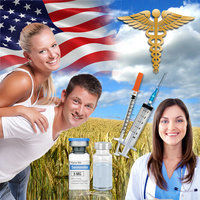Introduction
Testosterone Deficiency Syndrome (TDS), also known as hypogonadism, is a condition characterized by abnormally low levels of testosterone in men. This hormonal imbalance can have profound effects on various aspects of male health, including fertility. In the United States, where lifestyle factors and environmental influences may contribute to the prevalence of TDS, understanding its impact on male reproductive health is crucial. This article delves into the relationship between testosterone deficiency and fertility, focusing on semen quality and reproductive outcomes in American males.
Understanding Testosterone Deficiency Syndrome
Testosterone Deficiency Syndrome is diagnosed when a man's testosterone levels fall below the normal range, typically less than 300 ng/dL. This condition can be caused by various factors, including aging, obesity, chronic diseases, and genetic predispositions. Symptoms of TDS may include reduced libido, erectile dysfunction, fatigue, and decreased muscle mass. However, one of the less discussed but equally significant consequences of TDS is its impact on male fertility.
Impact on Semen Quality
Semen quality is a critical factor in male fertility, and testosterone plays a pivotal role in maintaining it. Studies have shown that men with TDS often exhibit reduced semen volume, decreased sperm concentration, and impaired sperm motility. These changes can significantly lower the chances of successful fertilization. For instance, a study conducted on American males found that those with testosterone levels below 300 ng/dL had a 25% reduction in sperm count compared to men with normal testosterone levels.
Reproductive Outcomes and Fertility
The link between testosterone deficiency and fertility extends beyond semen quality to affect overall reproductive outcomes. Men with TDS are more likely to experience difficulties in conceiving, and the condition may also increase the risk of miscarriage in their partners. Research indicates that testosterone therapy can improve semen parameters in some cases, but it must be administered cautiously, as excessive testosterone can inhibit sperm production through negative feedback on the hypothalamic-pituitary-gonadal axis.
Lifestyle and Environmental Factors
In the American context, lifestyle and environmental factors play a significant role in the development of TDS. Obesity, a prevalent issue in the U.S., is strongly associated with lower testosterone levels. Additionally, exposure to endocrine-disrupting chemicals, which are common in the environment, can further exacerbate the risk of TDS. Addressing these factors through lifestyle modifications and environmental awareness is essential for managing TDS and improving fertility outcomes.
Clinical Management and Treatment Options
The management of TDS in the context of fertility requires a multifaceted approach. Hormone replacement therapy (HRT) is a common treatment, but it must be tailored to the individual's needs to avoid adverse effects on fertility. Alternative treatments such as clomiphene citrate, which stimulates the body's own testosterone production, may be considered for men trying to conceive. Additionally, lifestyle interventions such as weight loss, regular exercise, and a balanced diet can help improve testosterone levels and enhance fertility.
Conclusion
Testosterone Deficiency Syndrome poses a significant challenge to male fertility in the United States. Its impact on semen quality and reproductive outcomes underscores the need for comprehensive management strategies. By addressing the underlying causes of TDS and employing appropriate treatments, American males can improve their chances of achieving successful conception. As research continues to evolve, it is imperative for healthcare providers to stay informed about the latest advancements in managing TDS and supporting male reproductive health.
Contact Us For A Fast And Professional Response

- 0001) Understanding Testosterone Deficiency: Symptoms, Diagnosis, and Treatment for American Men [Last Updated On: March 1st, 2025] [Originally Added On: March 1st, 2025]
- 0002) Testosterone Deficiency Impact on Muscle Mass in American Men: Diagnosis and Treatment [Last Updated On: March 17th, 2025] [Originally Added On: March 17th, 2025]
- 0003) Environmental Toxins Linked to Testosterone Deficiency in American Males [Last Updated On: March 17th, 2025] [Originally Added On: March 17th, 2025]
- 0004) Alcohol's Impact on Testosterone and TDS in American Males: A Comprehensive Analysis [Last Updated On: March 18th, 2025] [Originally Added On: March 18th, 2025]
- 0005) Testosterone Deficiency Syndrome: Symptoms, Diagnosis, and Management Strategies for American Men [Last Updated On: March 18th, 2025] [Originally Added On: March 18th, 2025]
- 0006) Testosterone Deficiency Syndrome: Impact on Energy and Treatment Options for American Men [Last Updated On: March 18th, 2025] [Originally Added On: March 18th, 2025]
- 0007) Stress-Induced Testosterone Deficiency in American Males: Causes, Effects, and Management [Last Updated On: March 19th, 2025] [Originally Added On: March 19th, 2025]
- 0008) Smoking's Impact on Testosterone Deficiency in American Males: Mechanisms and Mitigation [Last Updated On: March 20th, 2025] [Originally Added On: March 20th, 2025]
- 0009) Testosterone Deficiency Syndrome: Understanding and Managing with Hormone Therapy [Last Updated On: March 20th, 2025] [Originally Added On: March 20th, 2025]
- 0010) Testosterone Deficiency in Men: Symptoms, Prostate Health, and Treatment Options [Last Updated On: March 20th, 2025] [Originally Added On: March 20th, 2025]
- 0011) Testosterone Deficiency in American Men: Impacts on Mood and Treatment Options [Last Updated On: March 20th, 2025] [Originally Added On: March 20th, 2025]
- 0012) Weight Training Benefits for Men with Testosterone Deficiency Syndrome [Last Updated On: March 21st, 2025] [Originally Added On: March 21st, 2025]
- 0013) Chronic Illness Impact on Testosterone Levels in American Males: Management Strategies [Last Updated On: March 22nd, 2025] [Originally Added On: March 22nd, 2025]
- 0014) Testosterone Check-ups Crucial for American Males to Combat Deficiency Syndrome [Last Updated On: March 22nd, 2025] [Originally Added On: March 22nd, 2025]
- 0015) Testosterone Deficiency and Sleep Apnea: A Bidirectional Health Challenge for American Males [Last Updated On: March 22nd, 2025] [Originally Added On: March 22nd, 2025]
- 0016) Vitamin D's Role in Managing Testosterone Deficiency in American Males [Last Updated On: March 23rd, 2025] [Originally Added On: March 23rd, 2025]
- 0017) Testosterone Deficiency and Joint Health: Insights for American Males [Last Updated On: March 23rd, 2025] [Originally Added On: March 23rd, 2025]
- 0018) Magnesium's Role in Managing Testosterone Deficiency Syndrome in American Males [Last Updated On: March 23rd, 2025] [Originally Added On: March 23rd, 2025]
- 0019) Testosterone Deficiency Syndrome and Immune Function in American Men: A Comprehensive Overview [Last Updated On: March 23rd, 2025] [Originally Added On: March 23rd, 2025]
- 0020) Testosterone Deficiency Impacts Body Composition in American Males: Muscle, Fat, Bone [Last Updated On: March 24th, 2025] [Originally Added On: March 24th, 2025]
- 0021) Testosterone Deficiency Syndrome: Impacts on Skin Health and Management Strategies for American Men [Last Updated On: March 24th, 2025] [Originally Added On: March 24th, 2025]
- 0022) Soy Consumption and Testosterone Levels in American Males with TDS: A Complex Relationship [Last Updated On: March 24th, 2025] [Originally Added On: March 24th, 2025]
- 0023) Testosterone Deficiency Syndrome: Impacts and Management in American Male Athletes [Last Updated On: March 24th, 2025] [Originally Added On: March 24th, 2025]
- 0024) Shift Work's Impact on Testosterone Levels and Deficiency Syndrome in American Males [Last Updated On: March 24th, 2025] [Originally Added On: March 24th, 2025]
- 0025) Zinc's Vital Role in Combating Testosterone Deficiency in American Men [Last Updated On: March 24th, 2025] [Originally Added On: March 24th, 2025]
- 0026) Testosterone Deficiency Linked to Dental Health Issues in American Males [Last Updated On: March 24th, 2025] [Originally Added On: March 24th, 2025]
- 0027) Testosterone Deficiency in American Men: Impacts on Vision and Eye Health [Last Updated On: March 24th, 2025] [Originally Added On: March 24th, 2025]
- 0028) Testosterone Deficiency Syndrome: Impact on Cognitive Function in American Men [Last Updated On: March 25th, 2025] [Originally Added On: March 25th, 2025]
- 0029) Plasticizers' Impact on Testosterone Levels and TDS in American Men: A Review [Last Updated On: March 25th, 2025] [Originally Added On: March 25th, 2025]
- 0030) Testosterone Deficiency and Depression: A Critical Link in American Men's Health [Last Updated On: March 25th, 2025] [Originally Added On: March 25th, 2025]
- 0031) Omega-3 Fatty Acids: A Natural Approach to Managing Testosterone Deficiency in Men [Last Updated On: March 25th, 2025] [Originally Added On: March 25th, 2025]
- 0032) Testosterone Deficiency and Hair Loss: Understanding and Managing in American Men [Last Updated On: March 25th, 2025] [Originally Added On: March 25th, 2025]
- 0033) Pesticide Exposure Linked to Low Testosterone in American Men: Health Risks and Mitigation [Last Updated On: March 25th, 2025] [Originally Added On: March 25th, 2025]
- 0034) Air Pollution's Impact on Testosterone Levels in American Males: A Growing Concern [Last Updated On: March 26th, 2025] [Originally Added On: March 26th, 2025]
- 0035) Testosterone Deficiency Syndrome and Its Link to Hearing Loss in American Males [Last Updated On: March 26th, 2025] [Originally Added On: March 26th, 2025]
- 0036) Testosterone Deficiency and Anemia: Impacts and Management for American Males [Last Updated On: March 26th, 2025] [Originally Added On: March 26th, 2025]
- 0037) Testosterone Deficiency in American Males: Impacts on Memory and Cognitive Health [Last Updated On: March 26th, 2025] [Originally Added On: March 26th, 2025]
- 0038) Fenugreek: A Natural Solution for Testosterone Deficiency Syndrome in American Males [Last Updated On: March 26th, 2025] [Originally Added On: March 26th, 2025]
- 0039) Blue Light Exposure Linked to Testosterone Deficiency in American Men: Mitigation Strategies [Last Updated On: March 26th, 2025] [Originally Added On: March 26th, 2025]
- 0040) Chronic Stress and Testosterone Deficiency Syndrome in American Males: Impacts and Management [Last Updated On: March 26th, 2025] [Originally Added On: March 26th, 2025]
- 0041) Diet Soda Consumption Linked to Lower Testosterone Levels in American Men [Last Updated On: March 26th, 2025] [Originally Added On: March 26th, 2025]
- 0042) Testosterone Deficiency and Thyroid Dysfunction: Interconnected Health Issues in American Males [Last Updated On: March 26th, 2025] [Originally Added On: March 26th, 2025]
- 0043) Boron Supplementation: A Natural Approach to Managing Testosterone Deficiency in American Males [Last Updated On: March 27th, 2025] [Originally Added On: March 27th, 2025]
- 0044) Ashwagandha's Potential in Boosting Testosterone for American Males with TDS [Last Updated On: March 27th, 2025] [Originally Added On: March 27th, 2025]
- 0045) Testosterone Deficiency in American Men: Impacts, Diagnosis, and Treatment Options [Last Updated On: March 27th, 2025] [Originally Added On: March 27th, 2025]
- 0046) High-Fat Diets and Testosterone Levels: Impacts and Dietary Recommendations for American Males [Last Updated On: March 27th, 2025] [Originally Added On: March 27th, 2025]
- 0047) Testosterone Deficiency and Liver Health in U.S. Males: Impacts and Management Strategies [Last Updated On: March 28th, 2025] [Originally Added On: March 28th, 2025]
- 0048) TDS and Gallbladder Disease: Insights, Risks, and Management Strategies for American Males [Last Updated On: March 28th, 2025] [Originally Added On: March 28th, 2025]
- 0049) Testosterone Deficiency Syndrome: Impacts on Kidney Function and Management Strategies [Last Updated On: March 29th, 2025] [Originally Added On: March 29th, 2025]
- 0050) Testosterone Deficiency Syndrome: Impacts on Pancreatic Health and Cancer Risk in Men [Last Updated On: March 30th, 2025] [Originally Added On: March 30th, 2025]
- 0051) Heavy Metal Exposure and Its Impact on Testosterone Levels in American Men [Last Updated On: March 30th, 2025] [Originally Added On: March 30th, 2025]
- 0052) EMF Exposure and Testosterone Levels: Implications for TDS in American Males [Last Updated On: March 31st, 2025] [Originally Added On: March 31st, 2025]
- 0053) Tribulus Terrestris: A Promising Herbal Aid for Testosterone Deficiency in American Males [Last Updated On: April 1st, 2025] [Originally Added On: April 1st, 2025]
- 0054) Testosterone Deficiency Syndrome: Adrenal Health's Role and Management Strategies [Last Updated On: April 2nd, 2025] [Originally Added On: April 2nd, 2025]
- 0055) Testosterone Deficiency Syndrome: Impact, Diagnosis, and Management in American Men [Last Updated On: April 3rd, 2025] [Originally Added On: April 3rd, 2025]
- 0056) Noise Pollution Linked to Testosterone Deficiency in American Males: A Growing Concern [Last Updated On: April 5th, 2025] [Originally Added On: April 5th, 2025]
- 0057) Fluoride Exposure and Its Impact on Testosterone Levels in American Men [Last Updated On: April 6th, 2025] [Originally Added On: April 6th, 2025]
- 0058) Testosterone Deficiency Syndrome: Impacts on Hypothalamic Function and Management Strategies [Last Updated On: April 8th, 2025] [Originally Added On: April 8th, 2025]
- 0059) Testosterone Deficiency Syndrome: Impacts, Diagnosis, and Treatment in American Males [Last Updated On: April 10th, 2025] [Originally Added On: April 10th, 2025]
- 0060) DHEA Supplementation: A Promising Treatment for Testosterone Deficiency Syndrome in American Males [Last Updated On: April 10th, 2025] [Originally Added On: April 10th, 2025]
- 0061) BPA Exposure Linked to Lower Testosterone and TDS in American Men: A Review [Last Updated On: April 10th, 2025] [Originally Added On: April 10th, 2025]
- 0062) Ginseng's Potential in Managing Testosterone Deficiency Syndrome: A Comprehensive Overview [Last Updated On: April 10th, 2025] [Originally Added On: April 10th, 2025]
- 0063) Testosterone Deficiency and Pineal Gland: Insights for American Males with TDS [Last Updated On: April 10th, 2025] [Originally Added On: April 10th, 2025]
- 0064) Testosterone Deficiency Syndrome: Impacts on Urinary Health and Management Strategies [Last Updated On: April 10th, 2025] [Originally Added On: April 10th, 2025]
- 0065) Phthalates' Impact on Testosterone and TDS in American Males: An Emerging Concern [Last Updated On: April 11th, 2025] [Originally Added On: April 11th, 2025]
- 0066) Testosterone Deficiency Syndrome: Impacts on Gastrointestinal Health in American Males [Last Updated On: April 13th, 2025] [Originally Added On: April 13th, 2025]
- 0067) Testosterone Deficiency in American Males: Impacts on Respiratory Health and Management Strategies [Last Updated On: April 13th, 2025] [Originally Added On: April 13th, 2025]
- 0068) PFCs Linked to Testosterone Deficiency in American Males: Environmental Health Concerns [Last Updated On: April 14th, 2025] [Originally Added On: April 14th, 2025]
- 0069) Phytoestrogens' Impact on Testosterone Levels in American Men with Hypogonadism [Last Updated On: April 17th, 2025] [Originally Added On: April 17th, 2025]
- 0070) Testosterone Deficiency Syndrome: Impacts and Management in American Males [Last Updated On: April 17th, 2025] [Originally Added On: April 17th, 2025]
- 0071) Cordyceps: A Natural Approach to Managing Testosterone Deficiency Syndrome in Men [Last Updated On: April 17th, 2025] [Originally Added On: April 17th, 2025]
- 0072) Testosterone Deficiency Syndrome: Impacts on Metabolic Health and Management Strategies [Last Updated On: April 18th, 2025] [Originally Added On: April 18th, 2025]
- 0073) Triclosan Exposure Linked to Testosterone Decline in American Men: TDS Risks [Last Updated On: April 18th, 2025] [Originally Added On: April 18th, 2025]
- 0074) Parabens' Role in Testosterone Deficiency Syndrome Among American Males Explored [Last Updated On: April 19th, 2025] [Originally Added On: April 19th, 2025]
- 0075) Shilajit: A Natural Remedy for Testosterone Deficiency in American Males [Last Updated On: April 19th, 2025] [Originally Added On: April 19th, 2025]
- 0076) Testosterone Deficiency Syndrome: Impact of Endocrine Disruptors on American Males [Last Updated On: April 19th, 2025] [Originally Added On: April 19th, 2025]
- 0077) Testosterone Deficiency and Autoimmune Disorders: A Critical Link for American Males [Last Updated On: April 19th, 2025] [Originally Added On: April 19th, 2025]
- 0078) Testosterone Deficiency: Impacts on Neurological Health in American Males [Last Updated On: April 19th, 2025] [Originally Added On: April 19th, 2025]
- 0079) Testosterone Deficiency: Impacts on Skin, Hair, and Psychological Health in American Men [Last Updated On: April 21st, 2025] [Originally Added On: April 21st, 2025]
- 0080) Organophosphate Pesticides Linked to Testosterone Deficiency in American Males [Last Updated On: April 21st, 2025] [Originally Added On: April 21st, 2025]
















